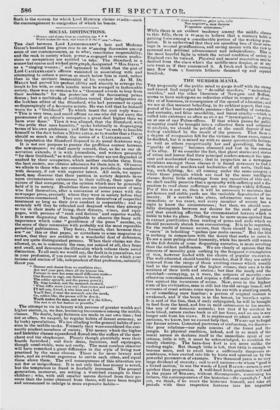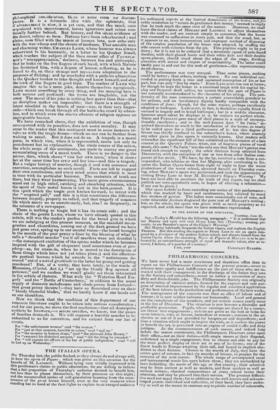THE MURDER-MANIA.
THE propensity of the public mind to gorge itself with the strong and rancid food supplied by " dreadful murders," " melancholy suicides;' and the other literature of Newgate and Bedlam, seems to have undergone no reduction either in respect of absur- dity or of baseness, in consequence of the spread of education; and we are at this moment beholding, in its sickliest aspect, that com- pound of the least respectable passions—that medley of cowardice and curiosity, and false sensibility, and latent cruelty—which is called into existence so often as ever an " investigation" is going on at one of our Police-offices. If that which passes for public- sympathy could be brought into a collective form and subjected to analysis. we should be petrified at the small deposit. of real feeling exhibited by the result of the process. That there is a degree of compassion felt for the victims in these cases, cannot be doubted, but it is mixed up with so many questionable feelings as well as others unequivocally low and grovelling, that the "quality of mercy " becomes obscured and lost in the amount of its alloy. If we consider the fact, that ghost stories and stories of crime and horror find their principal readers amongst the igno- rant and uneducated classes ; that in proportion as a newspaper circulates amongst those classes it is found necessary to feed it with accounts of murders and barbarities of all sorts, (bull-bait- ing, cock-fighting, &c. all coming under the same category;) while those journals which are read by the more intelligent classes derive little advantage from any casualties of this sort; we shall readily perceive that a sympathy with suffering and a dis. position to read about sufferings are two things widely different. For if this is not so, then it will be necessary to maintain that pot-houses and stable-yards are the veritable depositaries of hu- manity. If a murder take place, information cannot be too immediate or too exact, and every member of society has a right to know the circumstances ; but then, we should care- fully distinguish between our desires for the ends of justice and that sneaking affection for circumstantial horrors which is liable to take its place. Nothing can be more mean-spirited than to extract gratification from reading of pains and evils which we should personally shrink from encountering. It is to be regretted. for the credit of human nature, that there should be any thing "suave" in beholding " quibus ipse malis careas." But the blot is nothing in comparison with the deceit that seeks to cover it. To see a man puling about humanity, while his mouth still waters at the full details of some disgusting narrative, is more revolting titan the coldest indifference. We are clearly of opinion that the interests of morality gain nothing by the frequent contemplation of vise, however loaded with the chains of popular execration. The well-educated should humbly consider, that if they are safely removed from the range of those exciting causes which usually lead to the commission of the higher crimes, they owe it to the accident of their birth and station ; but that the needy and the wretched—occupying, as it were, the outposts of morality—are otherwise circumstanced, and require a different scale of fortifica- tion against the incursions of crime. Now, even in the highest state of his civilization, man is still but the-old savage tamed; and accounts of cruel actions come upon his ear with a startling sound, a; of something once familiar; a portion of original instinct is awakened, and if the brute is in the breast, he breathes again. It is said of the lion, that, if early subjugated, he will be brought to feed from the hand, and live in mild submission to his master, like any of our domestic animals; but that if by accident he taste blood, nature rushes back in all her force, and no one is any longer safe from his claws. It is unpleasant to admit such com- parisons, we know, but we cannot help that. We arc apt to forget our former selves. Conceited parvenus of civilization, we disown— like poor relations—our rude cousins of the forest and the jungle. In physical condition, indeed, and in so much of the moral nature as declares itself in the immediate spirit of our actions, little is left, it must be acknowledged, to establish the family identity. The barn-door fowl is not more unlike the rushing eagle. But though little is left, that little is enough to become more, and to swell into a sufficiently dangerous re- semblance, when excited into life by hints and spurred on by the powerful provocation of example. Two thousand years is no very large dividend of eternity ; and to evil natures—to whom "good is a forced motion," to use the words of Lord BACON—return is ever quicker than progression. A well-bred Irish gentleman will read in the pages of STRAD% without discomposure, concerning his fathers, the contemporaries of the historian—the cannibals ! And yet, we think, if he enact the historian himself. and take all periods with their respective features into his impartial philosophical consideration, there is some room Mr discom- posure. It is a favourite idea a ith the optimists, that if advancement is slow, it is yet sure, and that the mind, once
acquainted with improvement, leaves ignorance and crime con- tinually further behind. But history, and the silent evidence of the desert, refutes us here. Nations have been rebarbarized ; and plains, once filled with the music of human love, now echo only
with the war-whoop and the shouts of madmen. That amiable man and charming writer, CHARLES LAMB, whose humour was always
subservient to his humanity. in a letter to his Quaker friend, which touches the subject of the then recent affair of FAUNTLE• BOY'S " misappropriation," declares, between fun and philosophy, that he looks on the five fingers of each hand, with which Nature
has furnished him, with a degree of horror, reflecting, as he is forced to do, on their strange and mysietious adaptation to the
purposes of filching; and lie concludes with a pathetic admonition to the Quaker banker to take thought and know himself, and stay the trick of the fingers in good time. The readers of LAMB who
imagine this to be a mere joke, deceive themselves egregiously. LAMB meant something by every thing, and his meaning here is both serious and profound: the terms are laughable, not the sense. The moral of his joke is nothing less grave than this—that no discipline makes sin impossible; ''tliat there is a strength of latent mischief in the hearts of men—nay, in their very finger- ends—which can break through all the bulwarks raised by educa- tion, and to which even the mums aheneus of religion opposes uo impregnable barrier.
We have remarked above, that the exhibition of vice, though accompanied with its penalties, does not assist morality. It may occur to the reader that this sentiment must in sonic measure in- volve us with the tragic drama—which no one can be further from wishing to assail. But it does not do so. A tragedy is a moral poem, in which vice, when it is represented, meets not only its punishment but its explanation. The whole course of the action, the whole scope of the sentiments, are made to convey one great accumulating sense of a moral truth. There is no danger in the mirror, then, which shows " vice her own mien," when it shows her at the same time her error and her loss—and this is tragedy. But a vulgar history of murder, though it end with sentence and execution, accomplishes no such result. Facts are left to suggest their own conclusions, and every mind seizes that which is most in tune with its particular humour. The materials of truth are there, but they want harmonizing. The mere gross circumstances stand out in high relief, catching and absorbing attention, while the spirit of their metal lesson is lost in the background. It is this spirit which the tragic poet fetches forward, to invest with the " sceptred pall;" and this it is that constitutes the difference between tragedy, properly so called, and that tragedy of common life which meets us so unwelcomely, but, alas ! so frequently, in the columns of a newspaper. There is nothing so tragic but it has its comic side ; and the shade of the gentle LAMB, whom we have already quoted in this article, will win the reader's pardon for the broad grin in which we are indulging at this present moment, as the manifold incon- gruities and absurdities, issuing out of the dark ground we have just gone over, spring up to our mental vision—the bread brought to the mouth of the poor penny-a-liner by the blessing of what he calls a " dreadful murder" (as if all murders were not dreadful !) —the consequent exaltation of the spirits under which he becomes inspired with the gilt of eloquence (and sometimes even of pro- phecy—as, for example, when he is moved to the description of those things which have not yet taken place ;) and the affection- ate poetical horrors which he awards to the " unfortunate de- ceased "out of a sort of gratitude to the latter for going and getting murdered! But, of a verity, they have lately, in the words of Menenius, (Coriol. Act 2,) " set up the bloody flag against all patience;" and we confess we would gladly see them retrenched in the article of rhetoric. What with the " Waterloo Road Tra- gedy " and the " Battle of Canterbury," in addition to the usual supply of domestic melodramas and stock-pieces from Ireland— that great penny theatre!—they have so flourished over us their " bloody blameful blades," that we hardly know if our heads are on our shoulders.
Now we think that the condition of this department of our romantic literature ought to be taken into serious consideration ; and for our parts, we move the first resolution—that all descriptive epithets be forsworn,—a severe sacrifice, we know, but the peace of families demands it. We will suppose a horrible murder to be submitted to us for correction, and we extract from our list of errata.
For "the unfortunate woman" read "the woman."
For "just at that moment, horrible to relate," read "and so." For " the monster in human shape," read "the aforesaid John Brown." For "executed his diabolical purpose," read "did the thing he intended." For "will expiate his offence at the bar of public indignation," read " will be had up on Wednesday."



























 Previous page
Previous page